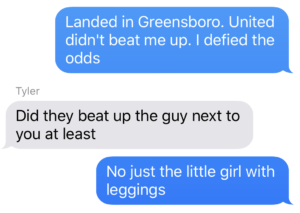NOTICE: This post references card features that have changed, expired, or are not currently available
In the last few weeks I had occasion to book several last minute domestic flights. In each case, there were cheap cash or mile-redemption options, but only with connections. Nonstop flights were insanely expensive.
On the outbound portion of one trip, I booked United Airlines for only 12,500 miles (and I used the trick described here to avoid close-in ticketing fees). The flights were fine. I didn’t get beat up. But I spent half the day flying a route that would have taken less than two hours direct.

My return flight was also booked through United, but as a separate ticket. Since I had booked it the day before, I knew that I had until midnight to cancel with no penalty. I decided to take another look at non-stop options. Each flight that worked with my schedule was listed at $465. Could I find a cheaper option?

Award prices for these flights from Greensboro to Detroit were also very expensive, but I remembered a trick I had written about before. Delta often prices awards from Greensboro to Buffalo much cheaper even if the flight includes a layover in Detroit. In this case, that wasn’t so, but it reminded me to try skiplagging (AKA hidden city ticketing).
Hidden city ticketing is the technique of saving money by booking a discounted flight with a layover in the city where you actually want to go. The idea is simply to get off at your intended destination and skip the final leg of the trip.
ITA Matrix vs. Skipplagged
I often use a tool called ITA Matrix to find the best flight deals. It requires a modest learning curve to get up to speed, but it’s incredibly powerful. For my destination, I selected all airports within 1000 miles of Detroit. And, in the advanced routing codes I put “DTW DL+”. This meant that the tool should only search routes that include a stop in Detroit (DTW) and with one or more Delta segments (DL+). Since I knew that only Delta flew nonstop to Detroit, I didn’t want to bog the tool down looking at other airlines.

This trick worked. ITA Matrix found a $200 flight to Chicago with the 7:25am nonstop to Detroit as the first leg. It also found a $249 flight to Toronto with the 12:45pm flight as the first leg. I decided to splurge and booked the flight to Toronto so that I could sleep in.
Another option I could have used was Skiplagged. Skiplagged is a consumer friendly tool which requires almost no training and it is able to find not just hidden city fares, but also cheap round-trips where you can discard the return. Out of curiosity, I checked Skiplagged to see if it could find the same or better options than ITA Matrix. In this example, it found the $200 Chicago option, but not the $249 Toronto flight.
Nervous flying
One downside to booking hidden city tickets is the potential for things to go wrong. Of course, you should never check bags when doing this since you wouldn’t want those bags to end up at the ticketed final destination. But what if there are weather or mechanical issues? If the first leg of your flight is cancelled or massively delayed, the airline may try to reroute you to your final destination.
Even though I’ve known about hidden city ticketing for years, I think this was the first time I’ve actually flown one. As a result, I was a little bit nervous. If anything went wrong, Delta could easily reroute me through Atlanta or LaGuardia to Toronto. So, I had a story ready… Since this flight to Canada was booked last minute (true), I didn’t have my passport with me (false). I had to stop in Detroit to get my passport.
Fortunately, I didn’t have to use my “I have to stop in Detroit” story. The flight was fine. And there were no repercussions. I earned miles and medallion qualifying dollars based on the segment actually flown. Excellent.
A couple of weeks later, I had to fly to Los Angeles for one night. I again turned to ITA Matrix, but I believe that Skiplagged would have worked just as well. For my outbound flight I booked Detroit to LA to Oakland. I booked the return separately: LA to Detroit to Kansas City.
This trip required being prepared with more creative stories since both itineraries were on the same carrier. In case someone noticed the odd back to back bookings, I wanted to be ready to answer why I was flying to Oakland one evening and flying from Los Angeles the next morning? My prepared answer went something like this: I have a quick meeting in LA and an evening meeting in Oakland. The next morning I’ll fly Southwest to LA to position for my next flight.
The flight to Los Angeles was uneventful. I was even upgraded to first class. That evening, at a US Bank event, I met the New York Times’ Frugal Traveler, Lucas Peterson. We talked about credit cards, points & miles, and travel. When I mentioned that I had used hidden city ticketing techniques to book the trip, he said that he wouldn’t do it. He had heard that if you put your frequent flyer number on the flights, the airline could close your account and take away all of your miles.
I hadn’t thought of that angle. I knew that airlines didn’t like people to use these tricks to save money, but I also knew that it was perfectly legal. At the same time, it is also legal for airlines to take away your miles for almost any reason. This had me a bit worried. I had used my Delta SkyMiles number on these flights. After all, I have top level status and hoped to get upgraded both ways. Even though I knew that the chance of repercussions were very small, I realized that the potential loss was great.
That night I Googled to see if it was common for airlines to shut down customers who do this. I found a Skift article that said that “Intentionally dropping airline segments can easily get one kicked out of a loyalty program citing an airline’s contract of carriage.” That was scary, but they didn’t post any evidence of this actually happening. Through other search results, I found a few mentions of airlines warning passengers not to do this, but I didn’t see proof of actual shutdowns. Admittedly, I didn’t search very long or hard, but just enough to satisfy me that the chance of repercussions were extremely low.
My final flight worried me for another reason. The flight to Detroit was oversold. And, coincidentally, a direct flight to Kansas City, one gate over, was scheduled to leave just 5 minutes earlier. Remember that I was booked to Kansas City via Detroit. If Delta was clever, they would realize that they could offer me a direct flight rather than a connecting flight and save the cost of bumping someone else. Of course, in this case, I wouldn’t take that offer, but normally it would be a win-win for everyone involved. Just in case, I had to have a good “must get to Detroit” story ready: I didn’t pack for my Kansas City trip. My wife is planning to meet me in Detroit with my packed luggage.
In the end, nothing bad happened. I wasn’t asked to change flights. I got to Detroit on time. Delta credited my account with the flight. The only bad part was that neither the flight’s wifi nor the in-flight entertainment worked. Normally I’d ask for compensation (extra miles) when this happens, but I didn’t want to draw extra attention to this flight. I let it go.
Is it wrong?
Booking flights with the intention to skip segments is legal, but whether it is ethically right or wrong is a matter of debate. The NY Times ethicist says that skiplagging is totally fine. He writes:
Purchasing something doesn’t mean you’re obligated to consume it in totality. You can use whatever portion of the purchase you choose. If you buy a loaf of bread, you don’t have to eat every slice.
Yeah, but… when you book a ticket you presumably agree to the airline’s terms which bar this practice. Isn’t it wrong to agree to something that you don’t plan to adhere to? Also, one could argue that not only is it wrong to lie, but simply planning to lie in case of irregular operations is wrong too.
Personally, the ethical considerations don’t bother me nearly as much as the practical worries I described above, but you should decide for yourself whether you feel it is right or wrong. I’ll respect you in the morning either way ;).
Skiplagging Rules and Suggestions
I don’t plan to book hidden city tickets often, but when circumstances demand it, it can be a useful tool. If you decide to try it, consider the following suggestions:
- The segment you plan to skip must be the last segment of your itinerary. If you fail to show up for an earlier segment, most airlines will cancel the rest of your trip. In general, this means that you should book these flights as one-ways as I did in the Los Angeles example, above.
- This technique only works when you are flying to a connecting airport (ideally a hub). For example, Detroit to Greensboro would not work because Greensboro is not a connection point to any other destinations. However, Greensboro to Detroit worked because Detroit is a Delta hub. Many connecting flights go through Detroit.
- Never check your bags. You do not want your bags to end up at your ticketed final destination. There are exceptions to this rule when flying internationally since you sometimes have to retrieve your bags along the way, but you seriously need to know what you’re doing if you rely on this.
- Avoid gate checking bags. In some cases when gate checking bags, the gate agent may try to check your bag all the way to your final destination. If you are forced to gate check your bags, make sure that it is checked only to your intermediate destination.
- Consider leaving your frequent flyer number off the ticket. If you’re worried about the possibility of losing your miles, you may be better off simply not earning miles at all for the flight. One big downside of this approach is if you have elite status: you won’t get any benefits during the flight and you won’t earn elite qualifying miles. Personally, I think I’ll continue to chance it.
- Always have a story ready. In case of irregular operations, the airline may try to reroute you to your final destination. Have a story ready about why you need to get to that connecting airport.
- Don’t try this with kids. I would only do this when flying alone. By myself, if I get stranded somewhere I didn’t mean to be, I can deal with it. I think it would be much harder to deal with if an entire family was traveling together.
- Try it with miles. The techniques presented here can work just as well with airline awards, but it can be a bit harder to find those opportunities. Airlines that tie award prices to ticket prices, though, are pretty easy. If you see a hidden city opportunity with Southwest or JetBlue, for example, you will probably find that you can get similar savings by booking that route with miles.
View from the Wing offers additional tips here: Using Hidden City and Throwaway Ticketing to Save Big Money on Airfare.
Skiplagging Tools:
- Skiplagged is ridiculously easy to use, but it doesn’t always find every possible hidden city opportunity.
- ITA Matrix is much less intuitive, but it is also more powerful.





[…] This trick, which is known as hidden city ticketing or skiplagging, goes against airline rules but is not illegal. I covered the topic in depth here: Skiplagging for the best flights at the best price. […]
Be careful with the “I need my passport” trick. I booked a flight HNL to (a large city in Texas) to Toronto because it was less than half the price of the flght from HNL to that large city in Texas. When I tried to check in to the flight, they demanded to see my passport and would not let me board the flight without it. I even used the “my wife is meeting me at the airport to bring me my passport” excuse but they wouldn’t let me on the plane without proof that I had everything with me required to complete the full flight.
[…] ITA Matrix is a powerful free took for searching airfares that includes a lot of complexity that is probably best understood by old-school travel agents. I am far from being an ITA Matrix expert. However, I attended a great session about using ITA Matrix years ago that was led by Scott Mackenzie at Travel Codex and learned enough to be able to use it somewhat effectively. More importantly, I learned enough to cause me to stumble forward and figure out additional capabilities as I’ve grown a bit. Greg has also written about times when the ITA Matrix tool can be useful, especially in terms of hidden city ticketing. […]
[…] Skiplagged: Find cheaper flights by intentionally skipping the final leg of your itinerary. For details about this technique (including important cautions), please see my post: Skiplagging for the best flights at the best price. […]
What if you don’t want to skip a flight, you just want your whole trip and it is less expensive through Skiplagged (which takes you to hop2) than any airline. Are the sites verified and flights real with no issues? Our first time using skiplagged so we are a little worried if something goes wrong.
I don’t have experience with hop2, so I can’t say.
[…] Skiplagging can be a fantastic way to save cash or miles, but it also has more potential gotchas then a throw-away return ticket. For full details please see: Skiplagging for the best flights at the best price. […]
[…] Skiplagging for the best flights at the best price […]
Skiplagged doesn’t appear to have Business so ITA is the best option there it seems?
I guess so!
Hidden city ticketing can also save money on Southwest (and its not against their rules). Since WN is not visible to ITAMatrix or SkipLag, you need to use WN’s online booking engine to manually check the prices for various “logical” “final destination” cities (which is easy and quick).
I was on a recent WN flight that stopped in San Jose and continued on to Portland. The price to Portland was about half the price to San Jose, so I booked to Portland and just got off in San Jose. I tried to do a good deed by telling the cabin crew their through count would be short 1, but it only seemed to confuse them. So I may just get off without telling anyone next time.
Do you call the airline to cancel your segment? This way they can at least try to sell the seat end it may generate Goodwill in the event they ever come back to you about it.
No, I didn’t call. I felt that calling would just draw more attention to it.
I’ve done this a couple times on United when flying to Houston. MSP-IAH direct: $300 OW. MSP-IAH-DFW: $89. I left my frequent flyer number off and had no issues, but I wouldn’t necessarily make a habit ofit.
Good article. I can’t remember where I read this from, but I seem to remember someone posted a long list of airport codes for searching skiplag flights. Can you share about how you generate list of codes for airports within 1000 mile radius from DTW?
As to generating the list of codes, on ITA Matrix if you look at Greg’s screen shots, you see where it says “Nearby” to the right of the “Departing from” and “Destination” fields? Click that and you can choose how large of a radius you want and then just check the boxes to add the airports you want to include.
I did as Nick suggested. As to who posted a list of airport codes, that would be Dan’s Deals forums: http://forums.dansdeals.com/index.php?topic=45539
That’s exactly what I was looking for. Thanks!
I’ve used ITA Matrix a handful of times over the years to “skiplag” when I needed to fly to or from a hub and the published fares and frequent flyer tickets were ridiculously expensive. It feels very odd to find a seat on an aircraft at a 75% discount just by wanting to take an ADDITIONAL flight!
Obviously, this stuff is to protect the monopoly pricing major airlines sometimes enjoy at their hubs. “Skiplagging” seems like a rather equitable solution to claw back some of that pricing power. Since I’m sure only a tiny number of pax do it — as our experiences demonstrate, even very frequent flyers do it rarely — I don’t think it’s a “major issue” for the airlines. They benefit way more by having this pricing structure than they “lose” by the handful of frequent flyers who occasionally skip their second segments.
One thing I wonder about, though. Have you ever had an airline retaliate against you by discussing something like this? Kind of like “Thanks for bringing this to our attention. Now that we realize you’ve broken our rules, we’ll punish you.” By doing so, of course, they’d scare other people away from this activity.
It is probably a greater loss to Delta if FM drop the affiliate links to Delta cards or talk snack about Delta’s employee try to boot off an infant passenger and send him to foster care. This will end like protectionistic war: everyone loses.
I don’t think this is a big enough issue for Delta to take action on.
I can’t imagine a carrier would even know someone was skiplagging unless they did it a lot.
That being said, now that you have “confessed” 🙂 to the whole world that you did it aren’t you at least a little concerned that Delta will catch wind of this a “get you”?
That’s what my wife said! No, I think Delta has far larger concerns than this.
Don’t burden yourself one more second with ethical concerns. The airlines are offering a product for sale and you are purchasing it. You are not stealing anything or paying them with fake money. The real ethical question here is why does a flight from Greensboro to Detroit have two vastly different prices in the first place depending how you book it? The answer is that the airlines are trying to maximize revenue by charging different prices to different people with varying degrees of desperation and therefore willingness to pay the higher price. To say they are allowed to do that, but you aren’t allowed to do the same to minimize cost is ethical hypocrisy. They should charge the same price for that leg regardless of final destination, which is your business and subject to the changes you see fit. If they want to play games with pricing, and hope a bunch of people don’t notice they are being gouged, then they have to accept the consequence that there will be some people that will notice the price game and adjust their purchase behavior accordingly.